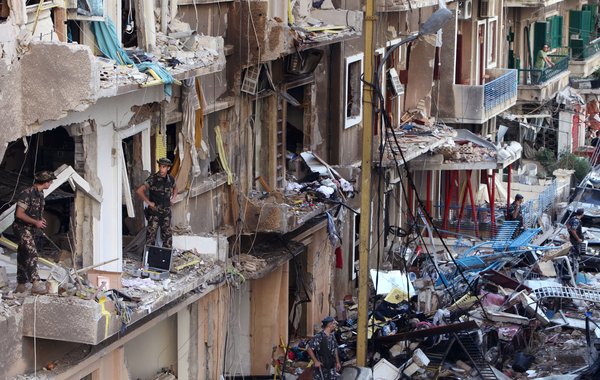Discovering MENA: Another Brick in the Wall

We all know Friday is a key day for everything regarding the Arab World. Last Friday was no exception. A huge car bomb exploded at the heart of the Beirut’s Christian neighbourhood of Ashrafiyeh (Christians were also the main target of a terrorist attack that took place yesterday in Damascus). It was the first large-scale explosion since 2008, an event that largely reminisced former PM Hariri’s killing in 2005, an act that sadly reminded Lebanese people what living in fear actually is.
The target of the bomb remained unclear during the first hours. 8 people died (4 of them have not yet been identified), more than 80 were injured, and a large swathe of land around the area was substantially damaged. First, people thought the bomb aimed at blowing up the Headquarters of the 14 March Movement (a coalition of the main parties in the opposition, that was able, together with the Lebanese themselves, to finally rout the Syrians in 2005) in the vicinity. But little by little rumors turned into news: the Security Chief Brig. Gen. Wissam Al-Hassan (main responsible for the arrest last summer of the Lebanese minister accused of collaborating with the Syrian regime) had been killed, and the Syrian regime (even though they quickly issued an statement condemning the attack) seemed to stand as the main culprit. The Syrian struggle had arrived in town.

The Official’s funeral was held on Sunday, and counted with the presence of thousands of Beirutis, later turning into a political rally. Several protests erupted afterwards, spreading deep concerns throughout the country and the whole region itself over the possibility of these events representing the first spark of a new sectarian conflict. Demonstrations mainly broke out in front of (and even tried to storm) Prime Minister Najib Mikati’s office, and were quelled by security forces using tear gas. Protesters called for the resignation of the Prime Minister, accused of being an ally of Assad’s regime, and heading a Government backed by the Shiite cum-militia Hezbollah, which has however remained silent. Nonetheless, many pundits believe the latter are not to be blamed, for they are nowadays unlikely to carry out such an attack, widely aware of the dangers a civil conflict could entail for them and their political standing.
Violent episodes have taken place in other cities, particularly in the northern town of Tripoli, where the confessional in-fighting resumed and 3 to 6 persons are said to have died. Sporadic shooting has been heard overnight in Beirut, but today the city seems plunged into what some may call “the calm before the storm”. The big question lingers on: “will the Syrian conflict spill over Lebanon”? Will the Lebanese have to stand another war? Time (and eventually Bashar Al-Assad!) will tell. We are going to have to wait (pray) and see. Political leaders and civilians themselves are certainly confronted with a difficult balancing act…
